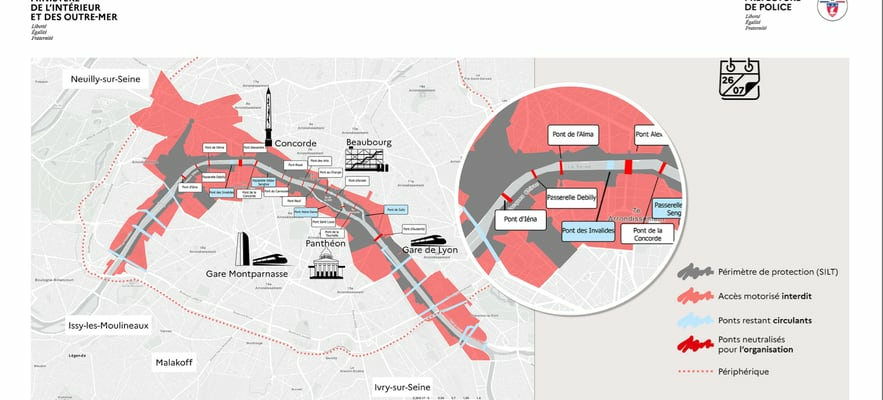Guarantee the fluidity of travel during the Olympic Games period in the capital. This is the real puzzle that the Olympic organizing committee has been working on for months.
Especially since the organizers are forced to deal with other variables supposed to guarantee maximum security around the event which should attract no less than 15 million visitors. L’Express gives you some advice to get around Paris as peacefully as possible this summer.
A QR code to get around
Among the solutions found, the implementation of a QR code, available since Monday, May 13. Some Parisians also received an alert at 8 p.m. yesterday, sent by the Ministry of the Interior, to warn them of the launch of this system. Popularized during the health crisis, this technology will provide access to secure perimeters. To obtain it, simply register on a online platform.
But not everyone is eligible for the QR code. Only residents, workers and visitors who have a ticket for the Olympic Games will be able to obtain one. Some exemptions nevertheless exist: in the event of a court summons or a medical appointment, for example. It will also be possible to access the Louvre Museum by downloading the QR code on the dedicated platform.
The request can be made for oneself and for one’s motor vehicle, upon presentation of an identity document, but also proof of address for residents and an employment contract for workers. If it is possible to download the QR code since Monday May 13, it will not be useful before July 18, the date of the start of the preparation period for the Paris Olympics.
What will the security perimeters be?
Thus, from July 18 and throughout the period of the Paris Olympics, the QR code will be essential to circulate in the gray zones, called “Silt” (Internal security and fight against terrorism) and the yellow zones in which it will be prohibited from driving a motorized vehicle.
Security perimeters set up on the day of the opening ceremony of the Paris Olympics, July 26
© / Security perimeters set up on the day of the opening ceremony of the Paris Olympics, July 26
Concerning areas subject to traffic restrictions, these will evolve between two pre-established periods. Thus, from July 18 to 26, the banks of the Seine will be closed to traffic, from the 12th to the 16th arrondissement on the right bank side, and from the 13th to the 15th century on the left bank side. The security perimeter extends to almost the entire 16th arrondissement from July 27. The Silt zone will, for example, cover the entirety of Avenue Kléber, from Place du Trocadéro to the Arc de Triomphe.
However, certain vehicles may obtain exemptions in order to access areas closed to traffic. This is for example the case for vehicles belonging to local residents or legal professionals, such as bailiffs, judges or even lawyers. Garbage collection trucks will also be able to circulate within the security perimeters, as will vehicles “of residents in hotels with parking located off public roads”, specifies the Ministry of the Interior.
Public transport networks
If you are not included in these categories, it is obviously strongly recommended to use public transport. Paris City Hall calls on visitors to “avoid taking the car” and to prefer the metro, bus or tram. Especially since “the 25 Olympic sites and the 17 Paralympic sites will all be accessible by transport”, assures the town hall.
In addition, 400 free shuttles will be deployed to the Games sites in the outer suburbs (Versailles, Saint-Quentin-en-Yvelines, Vaires-sur-Marne) and in western Paris (Roland-Garros and Parc des Princes) for spectators. To find them, the City of Paris has put in place special pink-colored signage to make travel easier.
Certain metro stations, “located directly around the security perimeters”, will however be closed until September 21. This is the case of “Concorde”, which closes its doors on May 17, one month to the day before “Tuileries”. Finally, the “Champs-Elysées Clemenceau” station will also be inaccessible from July 1st. With the exception of July 26, the day of the opening ceremony, the bus lines, which cross the two security perimeters, will continue to circulate. Deviations are expected.
Encourage cycling and walking
If it promises “a tailor-made transport plan”, with a reinforced offer “up to more than 70% on certain busy lines”, like line 9 of the metro, and the RER A and C, the town hall of Paris encourages Parisians and visitors “to think about mobility differently”. Implicitly, opt for journeys on foot or by bike. “Walking remains the most reliable way to ensure travel time,” specifies the town hall of France’s largest city.
Furthermore, “the operators of Vélib’ (21,000 bikes), “free-floating” bikes (25,000) and Parisian bike rental companies (5,400 bikes) will strengthen their offering and parking spaces will be added,” adds the Paris town hall. Without forgetting to proudly display its more than 400 kilometers of cycle paths.
